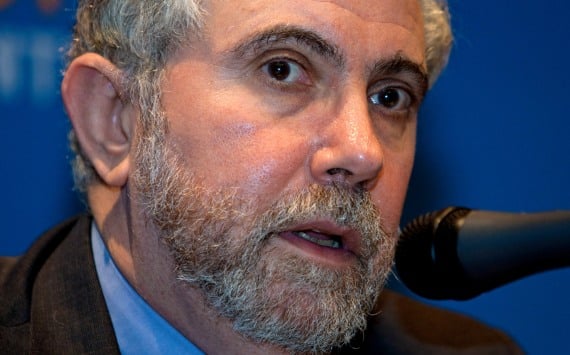State cutbacks and end of stimulus could add up to disaster, Nobel laureate says; pegs odds of worldwide recession at 50-50
The risk of another global recession has increased to one-in-two, said Nobel-prize winning economist Paul Krugman.
“There is a pretty good chance of an actual stall which would lead the global economy to slide backward,” he said in an interview in Yaroslav, central Russia, yesterday, describing the risk of a recession as “quite high, maybe 50 percent.”
Krugman, who last month said the risk of a global decline may be “a bit higher” than one-in-three, urged advanced economies to reverse fiscal belt-tightening and central banks to adopt a more expansionary monetary policy.
Three years after the collapse of Lehman Brothers Holdings Inc., the global recovery is faltering and the euro-region debt crisis is roiling markets and clouding growth prospects across the 17-nation euro region.
“They need to realize that for those countries which are not having financing problems -- at least five of the G-7 are able to borrow quite freely -- that they need to postpone austerity measures on the fiscal side and that the central banks need to be expanding, not tightening,” Krugman said, referring to the Group of Seven major industrialized nations.
Krugman, a columnist for the New York Times who was invited to give a speech at Russian President Dmitry Medvedev's global policy forum in Yaroslav, said China's fast-growing economy isn't large enough to help reverse the slump.
China, the world's second-largest economy, on Sept. 7 raised its growth estimate for 2010 to 10.4 percent.
‘Close to Zero'
Krugman also said President Barack Obama has “close to zero chance” of getting his $447 billion jobs plan passed by the Republican-held Congress, which means unemployment will stay persistently high.
“Realistically, the chance of getting any of it is very close to zero,” Krugman said before Obama unveiled his plan. “That's a bad thing. We're going to be seeing unemployment at something like its current levels, perhaps even higher, right through next year and beyond.”
Job growth in the U.S. stalled last month and the unemployment rate has hovered at or above 9 percent for more than two years. Obama, who faces re-election next year, has job- approval ratings at new lows as public doubts about his stewardship of the economy rise. Public opinion of Congress has dropped even lower.
Courting Republicans
U.S. gross domestic product climbed at a 1 percent annual rate from April through June, down from a 1.3 percent prior estimate, figures released by the Commerce Department on Aug. 26 showed. Combined with the 0.4 percent annual rate of growth in the first three months of the year, the past two quarters were the weakest of the recovery that began in mid-2009.
Tax cuts account for more than half the dollar value of the president's latest plan to turn the economy around, and administration officials said they believe that will have the greatest appeal to Republicans in Congress, who favor austerity over higher taxes and new spending. Obama dared his adversaries to oppose a provision that would extend and deepen payroll tax cuts due to expire on Dec. 31.
“The underlying situation is that with the fading out of the tail end of the original stimulus, plus cutbacks at state and local level, we're effectively in a regime of fairly harsh fiscal austerity with the economy still dead in the water, so this is a very bad scene,” Krugman said.
Obama's jobs plan follows the contours of his $830 billion infrastructure spending and assistance to local governments. Krugman said the plan is big enough to make “a significant dent” in unemployment.
--Bloomberg News--







